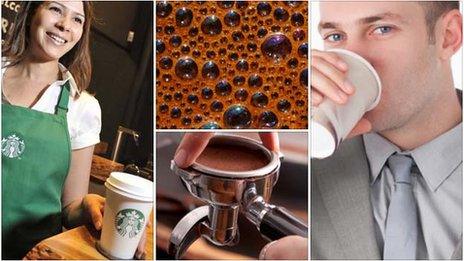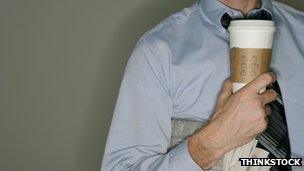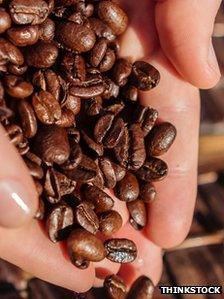Will you tell Starbucks your name?
- Published
- comments

Coffee chain Starbucks has begun asking its UK customers their names in a bid to appear more friendly. But do people really want to be on first name terms with their barista?
Just got your head around waiting in line and remembering whether you ordered a grande flavoured latte, a tall caramel macchiato or a venti mocha light frappuccino?
Scrap that. Starbucks wants to get back to basics.
"Have you noticed how everything seems a little impersonal nowadays?", its website asks wistfully. "We've all become user names, reference numbers and IP addresses.
"From now on, we won't refer to you as a 'latte' or a 'mocha', but instead as your folks intended: by your name," the coffee chain claims.
From now, as well as taking orders from customers, baristas will also ask what they are called so this can be scribbled on cups and called out when coffees are ready for collection.
All sounds very American? That is because it is.
But across the Atlantic, where the policy has been in place for years, Starbucks' friendliness has not always been reciprocated.
A cursory internet search throws up entire blogs dedicated to snaps of shoddy spelling and miswritten names on the firm's receptacles.
"Starbucks: Where no one knows your name, external," declares one. A practice employed to enhance brand loyalty presumably has the opposite effect when Pat is Tad, Jim turns into Tim and Margaret becomes Margrit.
"That's not my name, Starbucks, external," laments another - although many people see the funny side of their alter ego.
"Accents are tricky," sympathises contributor Paul Carr, of his new name Pole. "This is how you spell my name if you want to say it with a sexy voice," Cory says of Corres. "Haha I think it's a compliment", Nathalie says of Wow.
The temptation to try Bart Simpson's trick of making up fake rude names to raise a smile is also well documented.
So will the British embrace Starbucks' new-found familiarity, find it funny, or should the coffee chain be bracing itself for a backlash?
If comedian Arthur Smith, star of TV's Grumpy Old Men, is anything to go on, the brand might be in for a bumpy ride.
"I am not looking to make friends when I go into a coffee shop, I just want a drink," he complains.

Some drinkers are determined to withhold their identities from baristas
"I want a pleasant but respectful distance between me and the person serving me coffee - I don't want to go clubbing with them."
Certainly, initial reactions on Twitter were polarised.
While some were enthusiastic about Starbucks' offer of free coffee to promote the policy change, others were determined to humorously subvert what they saw as a breach of the implicit barista-customer relationship.
The latter is a sentiment that Chris Hackley, professor of marketing at Royal Holloway, University of London, believes many customers will share - particularly those who visit Starbucks' cafes in order to work, or to find a bit of solitary peace and quiet.
"Some people might like being called by their first name, but I think many will be indifferent, and some might feel awkward - like it's over-familiar, or a bit of an intrusion into privacy," he says.
Of course, for years smaller cafe chains and independent outlets have known that striking up conversations over a cuppa is a good way to do business.

Do these beans have your name on them?
But Hackley thinks Starbucks - at least when it is not someone's regular haunt - could also come under fire for appearing fake.
"Companies can overplay the importance of one-to-one communication. When people are not seeking it - like when they are gathering information on the internet or quickly purchasing a coffee - it can be quite irritating.
"It's a bogus personalisation of an economic relationship. Friendship needs to be genuine," he says.
However, Piers Guilar, group director of strategy at branding company Siegel + Gale, disagrees, for reasons that are relatively prosaic.
He thinks customers will benefit from name-calling, not least because the system has practical benefits.
"When a barista calls 'latte', sometimes 20 people might think 'is that mine?'," he says. "If they call my name, I'll know when my coffee is ready."
He concedes Britain's multicultural population might prove a bit of a minefield for baristas - especially in London - but he thinks Starbucks fans will forgive misspellings and mispronunciations.
As for its comic potential to prompt people to adopt a flurry of fake names, he says anything that makes a service a more fun experience has got to be a plus point.
"I like brands that have a go, and Starbucks is trying to break the conventions of selling coffee in big coffee chains - it's a solid attempt to get closer to the customer," Guilar adds.
"People will love it or hate it. Either way, it's distinctive and will get talked about."